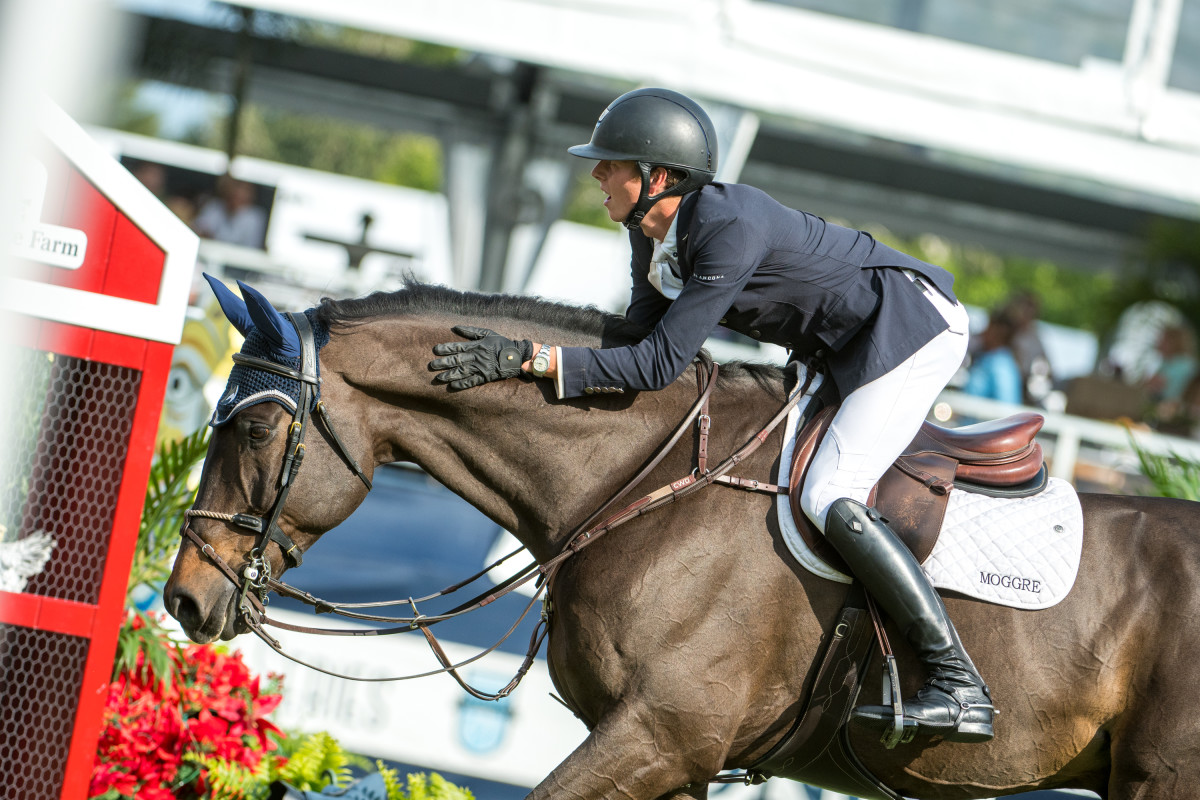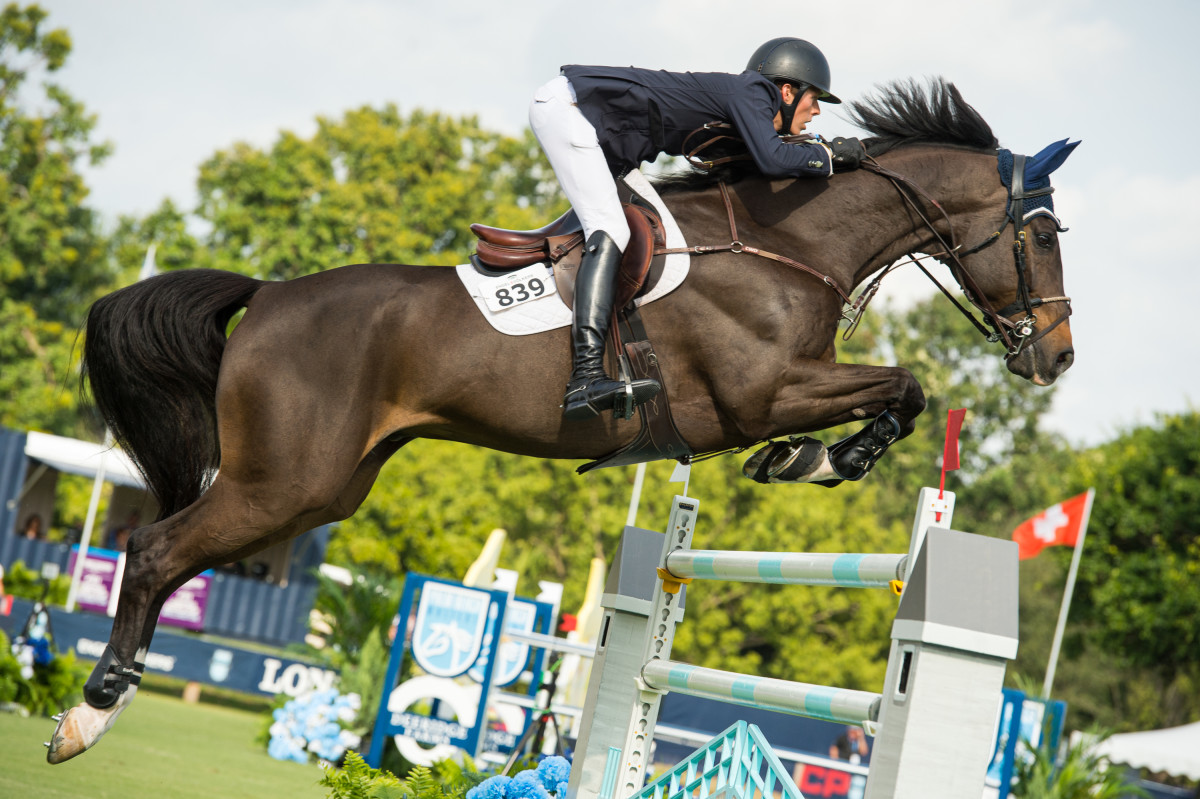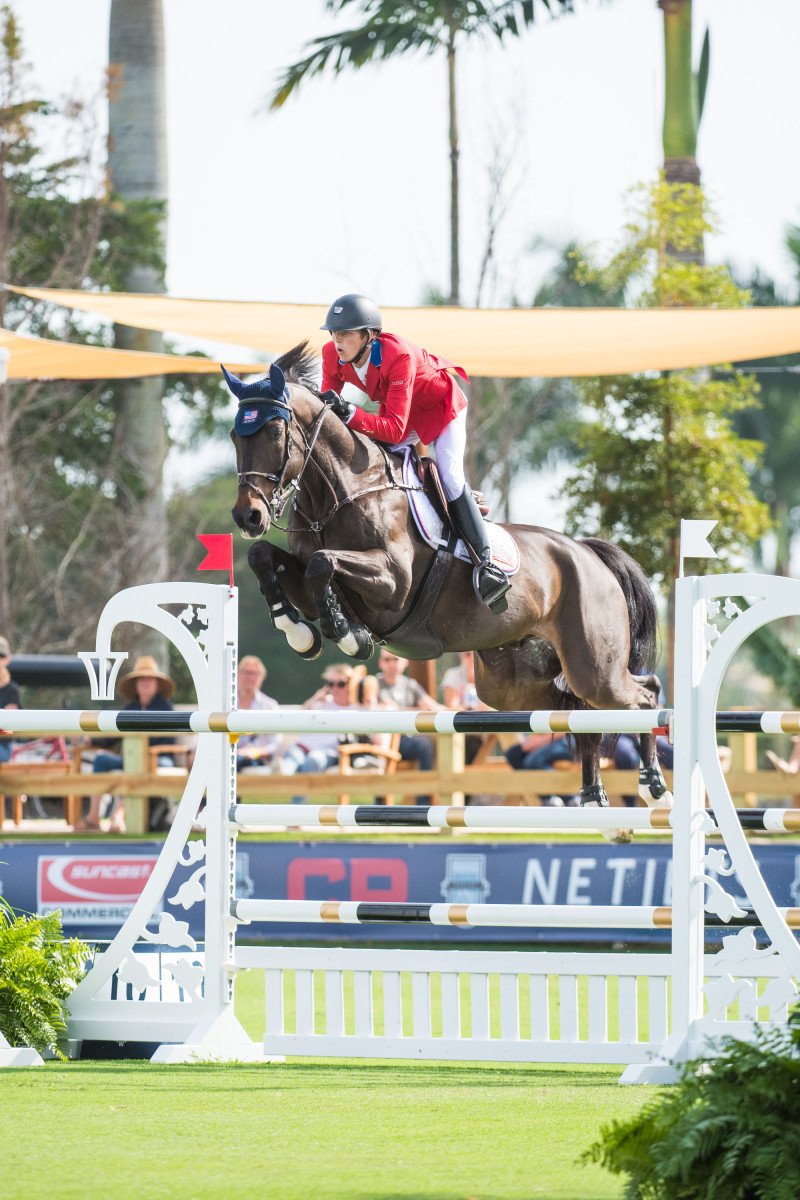Eighteen-year-old Brian Moggre began riding when he was just 2 years old, and as he grew older, focused exclusively on the jumper divisions. He contested his first mini grand prix at age 11, and his first grand prix at 13 or 14. He wasn’t introduced to the hunter and equitation divisions until much later in his Junior career—where he also excelled. Among his achievements were top 10 placings at the 2016 ASPCA Maclay Final and the Washington International Horse Show Equitation Final, first place in the 2016 $250,000 Junior/Amateur-Owner Jumper Prix at HITS Saugerties and team gold at the 2017 North American Junior Young Rider Championships. In 2018, he won his first major equitation title at the Dover Saddlery/USEF Hunter Seat Medal Finals, finished second at the ASPCA Maclay Final and was third at the Washington International Horse Show Equitation Final.
In March of 2019, Brian began to take the show-jumping world by storm when he and his Westphalian gelding MTM Vivre Le Reve, or Erkel, picked up their first international win at the Longines FEI Jumping World Cup Ocala. Moggre was just 17 at the time. His World Cup qualifier success continued into the next season, where he and Erkel won yet another qualifier—this time in Lexington at the prestigious National Horse Show. One week later, the pair placed third at the Royal Horse Show in Toronto. In late January, he was awarded the 2020 Lionel Guerrand-Hermès Trophy, presented annually to a young rider in one of the Olympic disciplines who demonstrates the team’s values of sportsmanship and horsemanship and shows great potential. Brian’s success continued in February when he delivered a double-clear performance in his senior Nations Cup debut to lead the U.S. team to a decisive victory in the FEI Jumping Nations Cup Wellington CSIO4*. Then in March, he finished second with Erkel in the $300,000 CSI5* CP Palm Beach Masters Final right before equestrian sport came grinding to a halt due to the coronavirus pandemic. Brian ended up finishing third in the World Cup Eastern Sub-League rankings, which means he would’ve been realizing his dream of competing in the World Cup Final next week, which of course, has now been cancelled because of the pandemic.
I caught up with Brian at his trainers’ Ken and Emily Smith’s base in Wellington at the beginning of January. During our conversation, Brian shared how he deals with pressure, what he thinks makes him a strong competitor, his future plans for his riding career and more.
You can listen to the full interview wherever you listen to podcasts, but in the meantime, here is a snippet of our conversation.
How did your love of horses and riding begin?
BM: When I started riding, I was almost 3 years old, so I can tell you what my parents have always told me. Since I was a little kid, the house that we first lived in—there was a farm down the street and when they would take my sister to school, I would always want to stop and see the horses and the ponies. So I’d make them stop almost every single day. That happened for about a year or so and then I got pony ride lessons from that farm and I was supposed to be 5, but I was 5 for three years (so I was about 2-years-old when I started). I just stuck with it. I have two siblings, a brother and a sister and we all tried it and I’m the only one that stuck with it. Ever since then, I’ve just been riding every single day and I’ve never known a day where I haven’t been riding.

To what do you attribute such early success in your career?
BM: Hard work and dedication and having a great support system behind me, as well as the horses to do it. My parents, since Day 1, have constantly supported me and have give me the world in the sense of riding. I have three fantastic horses. I have MTM Vivre le Reve, MTM Flutterby and MTM Los Angeles. Those horses as well as all the horses I’ve had previously, it all just teaches you how to become the rider you want to be and Lesley Leeman who takes care of my horses does a fantastic job and she always makes them look their best and feel their best and I think that plays a huge factor in it as well. It’s just the constant dedication and drive to be serious about this sport.

Do you have a routine before a big class?
BM: I am very superstitious and so is Leslie, who helps me. We have a system, we have a routine and we never stray from it, even down to what shirts I’ll wear for certain classes. I have a certain shirt for qualifiers, a certain one I wear for grands prix. I never like to change anything right before a class even if it’s the spurs or a spur strap—any little thing. About an hour before the class, Leslie and I both disappear. She goes and gets ready and takes care of the horses and I go to the ring and just focus on myself and we just have our moments of silence to mentally prepare and get in our zone and then it’s “go time.” That system has worked for us thus far, so we’re going to continue to do so and hope that it stays the same.

Do you get nervous? When you’re mentally preparing, is it nerves you’re trying to calm?
BM: Yes, I get very nervous and that’s always been me. I think it’s what gives me a competitive edge as well. If you’re not nervous, you’re not serious about it. Whatever the outcome may be, maybe you’re scared to jump the fence height, maybe you’re scared for the result—scared isn’t a great word, but nervous for it. I think it gives me that extra edge to perform at my best.
What makes you a strong competitor?
BM: Ever since I was a kid, I’ve always had a very competitive personality even with my siblings and what they were doing. My brother played sports. He played soccer and baseball and even I would try to learn on the side just that I could be better than him, which is terrible but it’s true. I’ve always just been naturally competitive and I want to be on top of the world and to have the support behind me and the mentality that I have, I’m going to do everything that I can to make that happen for myself and my team.

What’s the hardest part of this sport for you?
BM: The hardest part about the sport has got to be that every day is a new day and one day you can be a hero and the next day you can be zero. I think it’s something that every rider has to deal with and it’s just the reality of the sport and it’s difficult but I also think that makes riders want to work harder, be more dedicated and try to reach for that “hero” day every single day and to not get yourself too day whenever you have one of those “zero” days.
Listen to the full podcast here.
About the Practical Horseman Podcast
The Practical Horseman podcast, which runs every other Friday, features conversations with respected riders, industry leaders and horse-care experts to inform, educate and inspire. It is co-hosted by Practical Horseman editors Sandy Oliynyk and Jocelyn Pierce. Upcoming episodes are with the legendary show jumper, Eric Navet, hunter rider Hannah Isop and equestrian nutrionist Natalie Gavi. Find the podcast at iTunes, Stitcher and Soundcloud or wherever you get your podcasts.
This podcast episode is brought to you by Cosequin®






